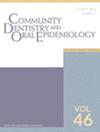Oral and oropharyngeal cancer screening and tobacco cessation discussions, NHANES 2011–2018
Abstract
Objective
Oral cavity and oropharyngeal cancer (OOPC) is a devastating disease often caught in late stages. People who use tobacco are at higher risk of OOPC. Tobacco cessation discussions and OOPC screenings are important factors in decreasing the risk of OOPC or its late stage diagnosis. As research on sex differences has been increasing—from research on biomedical to psychological and sociological determinants—there is a potential difference, by sex, as to whom is more likely to have a tobacco cessation discussion and OOPC screening. The objective of this study is to determine if there is an association of sex with tobacco cessation discussions and OOPC screenings conducted by dental healthcare professionals among participants who currently use tobacco.
Method
Data from 8 years of the National Health and Nutrition Examination Survey (2011–2018) were merged. Data from participants, ages 30 years and above, who self-reported current use of tobacco, a dental visit within the previous year and responsed to questions about oral cancer screening were analysed for frequency determination and logistic regression analysis. Having the combination of neither OOPC screening nor discussion about the benefits of not using tobacco was the outcome in the analysis.
Results
There were 22.1% who had an OOPC screening by a dental professional within the previous year. Of the 41% who reported having had a conversation with a dental professional within the previous year about the benefits of tobacco cessation, 9.8% reported having both the conversation and OOPC screening. Males were less likely than females to have the combination of neither OOPC screening nor advice about tobacco cessation than females (adjusted odds ratio: 0.74; 95%CI: 0.57, 0.96).
Conclusion
There is an increased need for OOPC screening and the discussion of tobacco use by dental professionals among their patients who use tobacco, particularly for female patients.

 求助内容:
求助内容: 应助结果提醒方式:
应助结果提醒方式:


